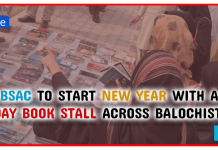Lyari Literary Forum (LLF) held a Circle Program on the topic entitled ‘Karachi in Post-Modern Era’. The lecture was delivered by Hanif Dil Murad and Mullah Fazul Library, Lyari, was the venue of the Circle Program. LLF is a forum which wants to engage youth with literature.
Hanif is a historical researcher who has received his post doctorial education from History Department of University of Karachi.

In today’s Circle program, the speaker, Mr. Hanif, discussed about the post-modern era of Karachi in detail where the sociopolitical situation of the Baloch people was portrayed in order to understand the current worsen social, economic and political condition of more than three million Baloch living in Karachi.
The speaker depicted the history of the city Karachi date back to 1945 and before it where the residents of the Karachi city were Baloch and Jokie, a Sindhi tribe, but the entire situation changes when Pakistan came to existence in 1947.
Before 1947, the Baloch residents of Karachi along with the Jokio were living a prosperous life in the city. They were developed economically, socially and politically, but with the establishment of Paksitan a big part of the Muslim population migrates to Karachi in a sudden which completely changed the demographic condition of Karachi, and its main affectees were Baloch and the Jokio.

The Baloch people after 1947 lost their domination over economy, society and politics of Karachi gradually. This loss of the domination badly affected the Baloch society where the associations which had represented the Baloch population and its issues were vanished. Because of the lost of the Baloch association, the Baloch lost its political representation also by losing its economic domination.
The consequences of the lost of this Baloch domination over the city is faced by the Baloch population of Karachi even today. We see the major portion of the Baloch population is passing life under the line of poverty, they are socially least developed and despite having a population of more than three million, they don’t have any political party for their representation in Sindh assembly, and the non-Baloch political parties like Paksitan Peoples Party (PPP) had filled this vacuum, but they did nothing for their Baloch voters educationally, economically and socially.

But the Baloch people can resolve all these problems by claiming all those rights which are mentioned in the 1973 constitution of Paksitan. Despite living in millions, the Balochi language does not have any legal status in Karachi or Sindh as in interior Sind a large number of Baloch population resides.
If Baloch people want to gain their basic rights of living in Karachi, for this purpose they have to struggle a lot at the legal forum. The Baloch parliamentarian in Sindh assembly or in national assembly representing the Baloch population of Karachi can be asked regarding the solution of all these issues by passing bill in the assembly.
Today we see that the Baloch population is the land mass of the city who own majority of the land from Yousuf Goth, sub-urban area, of Karachi to Lyari, Malir and other areas where Baloch live in majority which shows that Baloch is the son of soil here, despite being the son of soil, Baloch is living in a miserable life in Karachi.

When we think that what are the causes of this condition of Baloch people in Karachi, then we come to know that lack of awareness about their basic rights of life is one of the biggest issues.
The Baloch people of Karachi resolve their social, economic and political issues by enriching the Baloch youth with education because the youth represents the nation. Therefore, more you share awareness about these problem, more you educate the youngsters, more you find the solution of your all problems scientifically.










